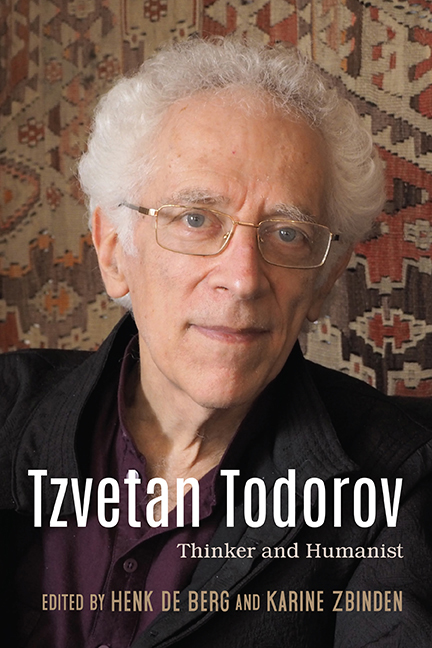Book contents
- Frontmatter
- Contents
- Acknowledgments
- Introduction
- 1 A Marginal Centrist: Tzvetan Todorov and the French Intellectual Field
- 2 Todorov and Camus
- 3 The Enlightenment Redux: Autonomy in Todorov, Glucksmann, and Onfray
- 4 Todorov's Reading of Rousseau: A Heritage for Our Times?
- 5 Tzvetan Todorov's Enlightenment
- 6 Todorov and Bakhtin
- 7 Tzvetan Todorov and the Writing of History
- 8 Tzvetan Todorov and the Trials of History: A Dissenting Voice
- 9 European Integration and the Cultural Cold War: Todorov and Denis de Rougemont
- 10 Tzvetan Todorov on Totalitarianism, Scientism, and Utopia
- 11 Tzvetan Todorov's Political Philosophy
- 12 Interview with Tzvetan Todorov
- Notes on the Contributors
- Index
2 - Todorov and Camus
Published online by Cambridge University Press: 26 April 2020
- Frontmatter
- Contents
- Acknowledgments
- Introduction
- 1 A Marginal Centrist: Tzvetan Todorov and the French Intellectual Field
- 2 Todorov and Camus
- 3 The Enlightenment Redux: Autonomy in Todorov, Glucksmann, and Onfray
- 4 Todorov's Reading of Rousseau: A Heritage for Our Times?
- 5 Tzvetan Todorov's Enlightenment
- 6 Todorov and Bakhtin
- 7 Tzvetan Todorov and the Writing of History
- 8 Tzvetan Todorov and the Trials of History: A Dissenting Voice
- 9 European Integration and the Cultural Cold War: Todorov and Denis de Rougemont
- 10 Tzvetan Todorov on Totalitarianism, Scientism, and Utopia
- 11 Tzvetan Todorov's Political Philosophy
- 12 Interview with Tzvetan Todorov
- Notes on the Contributors
- Index
Summary
IN A WELL-KNOWN PASSAGE from Arthur Conan Doyle's story “Silver Blaze,” Sherlock Holmes, called in to solve a murder, remarks on “the curious incident of the dog in the night-time.” When a Scotland Yard detective replies the dog did nothing during the night, Holmes announces, “That was the curious incident.” While it does not involve skullduggery, a similar air of mystery clings to the subject of this chapter. Were Holmes to read the seminal works by Tzvetan Todorov, particularly th ose devoted to drawing the historical and moral lessons of the twentieth and twenty-first centuries, he might ask about the curious place of Albert Camus in Todorov's oeuvre. Upon being told that Todorov rarely mentions the French Algerian artist and intellectual, Holmes would counter that this is, indeed, why his place is so curious. Why this absence is worthy of our curiosity, as I will suggest in this chapter, has to do with the ethical exigencies and personal experien ces shared by the two men.
Camus and Todorov, first of all, had complex ties to France. In effect, both were outsiders at home. Born in French Algeria in 1913, Camus first visited the metropole in 1937. Though Paris won him over during his brief stay—“Je ne trouve pas d’autre mot que celui de tendresse”— he would always feel like un etranger, an outsider, to his fellow French. He never lost his French Algerian accent—indeed, to amus e friends, he often exaggerated it—just as he never felt completely at home in Paris or among the French. Algeria, he writes in a note to his unfinished novel Le premier homme (The First Man, 1994), was his “true country” and “the land I so loved under the sun where I was born.” The Algerian War of Independence, which tormented Camus during the last years of his life, served only to deepen this sense of depaysement in France and his attachment to Algeria.
Similarly, Todorov, born and raised in communist Bulgaria, always viewed himself as un homme depayse in his adopted country. It goes without saying that he did not display the visceral nostalgia for his birthplace that Camus did for his. Never could he have said, as did Camus about his native Algeria, that Bulgaria “is caught in my throat.”
- Type
- Chapter
- Information
- Tzvetan TodorovThinker and Humanist, pp. 43 - 54Publisher: Boydell & BrewerPrint publication year: 2020



